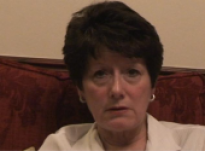Beverley - Interview 10

Age at interview: 56
Age at diagnosis: 47
Brief Outline: Beverley was diagnosed with breast cancer in 2002. She received a mastectomy, chemotherapy, radiotherapy and hormone therapy. Her surgery has left her with ongoing pain.
Background: Beverley is married with two children. Ethnic Background: White British.
More about me...
Beverley noticed a lump in her chest, and had 37 lymph nodes biopsied before her breast cancer was diagnosed through core biopsies. The diagnosis stage took quite a long time. She was diagnosed with an aggressive Grade 3 cancer. Because it was a high grade tumour her specialist said her cancer may return but she has to try and keep busy and not think about that.
She received a full mastectomy, chemotherapy and radiotherapy. The chemotherapy shrunk her ovaries and she experienced hot flushes. It was difficult and upsetting to lose her breast, which was really hard at the time but now she feels that she has come to terms with it. Beverley thinks that it’s hard for any woman to lose her breast, but she does feel that the mastectomy may have saved her life. She wasn’t offered a reconstruction at the time of her mastectomy and she doesn’t now want to go through the lengthy operation. Following her initial treatment, Beverley also received tamoxifen and Arimidex. The tablets have also led to some loss of bone mass, which is being monitored through regular bone density scans.
Beverley experiences long term pain every day due to her breast surgery. She is on painkillers, but the pain has affected what kind of work she can do.
She was surprised when she was discharged from regular hospital follow-up, but is glad that she doesn’t have to go back to the oncology department at the hospital anymore. Beverley dislikes attending for screening mammograms, as it makes her a cancer patient again.
She tries to avoid thinking about cancer on a daily basis, and just tries to enjoy her life. Having had cancer has made her feel much stronger and more confident. The whole experience has become easier to live with over time. Her message to other people living past cancer is to make the most of every day they have.
After taking tamoxifen for 5 years for her breast cancer, Beverley was moved onto Arimidex; the treatment gives her hot flushes but she hopes to keep on it to control her oestrogen levels.
After taking tamoxifen for 5 years for her breast cancer, Beverley was moved onto Arimidex; the treatment gives her hot flushes but she hopes to keep on it to control her oestrogen levels.
SHOW TEXT VERSION
PRINT TRANSCRIPT
I do go up for regular tests, mammograms and things, and also because the other thing is that they’ve done with me is after five years, I mean you’re prescribed tamoxifen for five years for breast cancer, but because they said I was relatively young, which my children laugh about, they kept me on tablets. They haven’t taken me on. I went straight onto Arimidex, so you also get hot flushes from the tablets.
Because they actually produce sweat so, you know, it’s a, but the thing is they’ve done that they’ve kept me on the drug, so I’m still on the Arimidex. Maybe they’ll come up with something else afterwards. Hopefully they will because my cancer was oestrogen based, so they have to stop my body making so much oestrogen, which is why they’ve kept me on the tablets.

